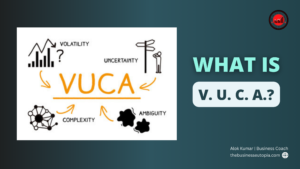The term VUCA has become very common in business and it’s probably never been as relevant as it is right now. The VUCA acronym stands for volatility, uncertainty, complexity and ambiguity and is used to describe situations that are difficult to understand, making it hard to predict the outcomes of any actions taken.
Simply put, VUCA is a way of saying, “Things are hard to understand and predict at the moment!” and while this sentiment is often true, VUCA can help provide some structure and clarity around the problems that an organisation might face. One danger of VUCA however, is that people use it as a way of avoiding planning and strategy by focusing on the idea that you can’t plan for a VUCA world.
Where does VUCA come from?
VUCA was first introduced as an idea in the late 1980’s by the US Army War College who used the concept to develop strategic leaders. In 1991, Herbert Barber officially used the term in his article in the Journal of Management Development titled, “Developing strategic leadership: The US Army War College experience.” where he stated that the college derived these ideas from the book of Warren Bennis and Burt Namus Leaders: The Strategies for Taking Charge.
In Barber’s article, it was established that the war college decided to use the VUCA acronym as a way to help their students (typically senior military officers) characterise the turbulent times they would face as they progressed into strategic roles. In military context, the acronym was used primarily to mark the early situation in Afghanistan at that time, which was hard to predict.
The idea of VUCA was soon picked up by the civilian community who began to realise that elements of VUCA also applied to the volatile markets and difficult conditions that businesses often face. The VUCA concept began being applied to boardroom discussions where it influenced decision making and was used as a method of understanding where there was a lack of predictability and so helping improve business performance.
What does VUCA (volatility, uncertainty, complexity, ambiguity) mean?
The four components of VUCA can be summarised as follows…
Volatility is about the increasing pace of change, whether that be in the markets, the industry or in the world in general. It’s clear that things change constantly and even the way that things change is changing. In recent times, this volatility has been magnified by both technological advancement and globalisation. It’s also noted that the more volatile the world is, the more things change and what is right today, may not be right tomorrow.
Uncertainty is about the extent that we can reasonably predict the future. We can’t rely on our capacity to identify what will happen in a business environment and the more uncertain things are, the harder they are to predict. It is becoming harder and harder to forecast what is going to happen and the likelihood of surprises has risen.
Complexity is about the many different and interconnected parts of problems that we face. The more elements of an issue or environment there are, the more difficult it becomes to analyse and come to a rational solution. Where things are complex, an action can have consequences that are not foreseen.
Ambiguity is about not having enough clarity regarding a problem to make an informed decision about it. Information may be incomplete, contradicting or too inaccurate to draw definite conclusions. Where there is ambiguity, you are facing the unknown with a lack of clarity, no simple answers and multiple layers to problems and the current situation.
How is VUCA useful in a business setting?
Developing a good understanding of VUCA can help modern leaders better appreciate the rapidly changing landscape in the current business world and the challenges that leaders face. It’s important that today’s leaders understand the expectations placed on them and to ensure they have the abilities and mindset to adapt to these challenges. These leaders need to be adaptable and have the appropriate mental and emotional skills to manage uncertainty and risk.
Aside from helping prepare leaders, VUCA can act as a checklist of the key factors an organisation should be considering with their decision making. It gives some clarity about the issues faced and helps to focus on the knowns and unknowns in the context of business challenges faced both internally and externally.
A useful checklist is the VUCA Matrix, which was developed in 2014 by Nathan Bennet and G. James Lemoine and published in a short article at the Harvard Business Review. It demonstrates the four VUCA elements working in relationship with each other.
This matrix is a useful guide to help you identify, get ready for, and respond to events in each of the four VUCA categories.
Why is VUCA important?
VUCA provides a model that helps people understand the reality of the challenges faced by businesses and organisations that they may feel they have little control over. It helps them to understand that the VUCA world is a common factor in both life and business, so learning to navigate them is crucial to long term success.
VUCA will always impact the decision making process for organisations and the people within them. It will affect how they make plans, manage risks, adapt to change and solve problems. We can’t necessarily rely on the old methods of forecasting and planning and so need to adapt our methods and approach these issues in new and creative ways. It helps us to devise plans that are able to adapt to constant changes and flex where flex is needed.
Ultimately, VUCA helps us to realise that old ways of working cannot be relied upon and to succeed in a VUCA world means being agile and having the ability to adapt to the changing winds. Our journey is not always going to be linear and there has become a real need to live in the moment and change when needed.
Trainer Bubble provide an e-learning course that helps develop your employees knowledge and understanding of VUCA. Visit the link to find out more. You can also explore VUCA in unison with other useful tools with our VUCA, Agile and Scrum e-learning course.
Courtesy Andrew Wood




